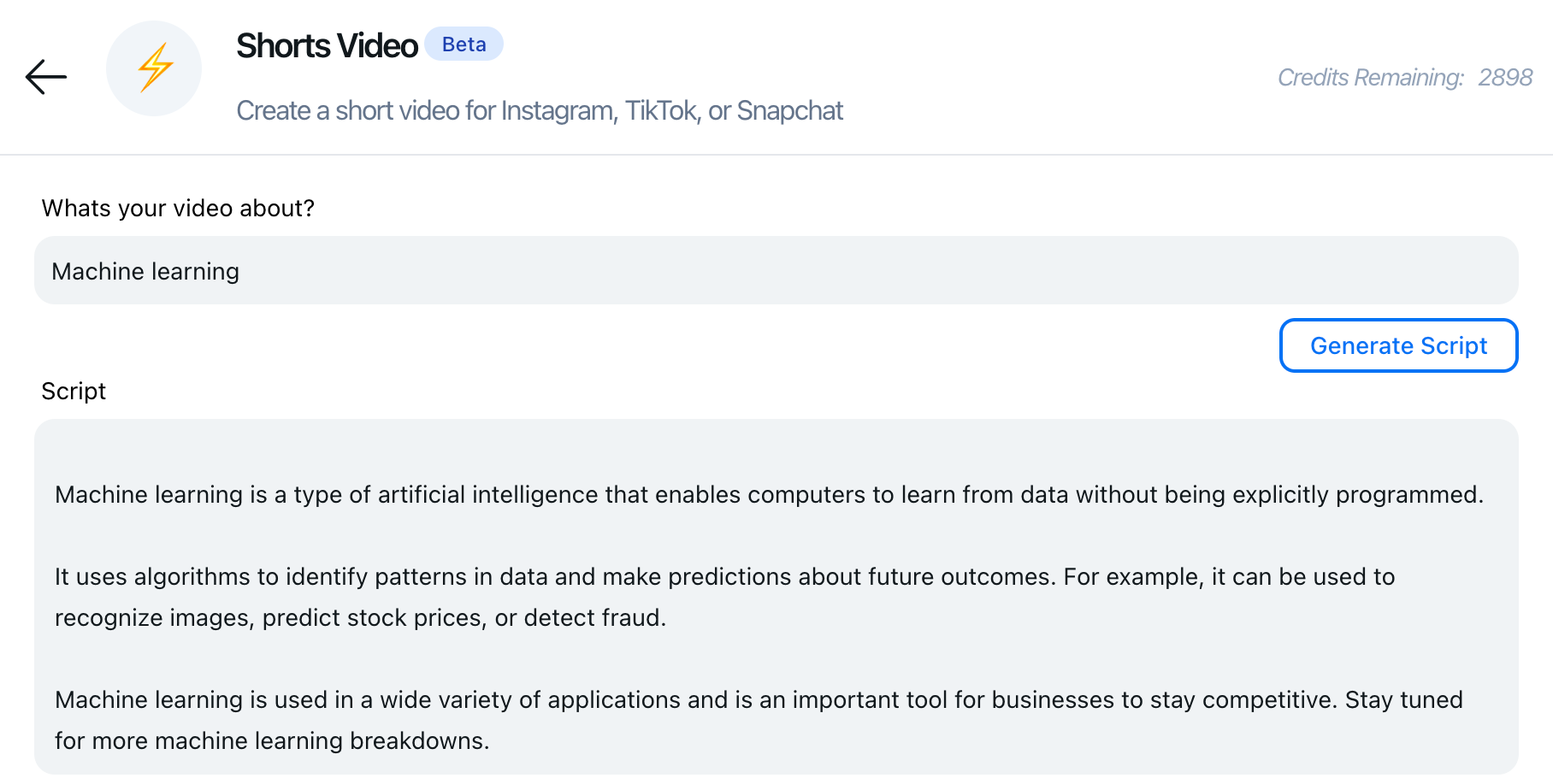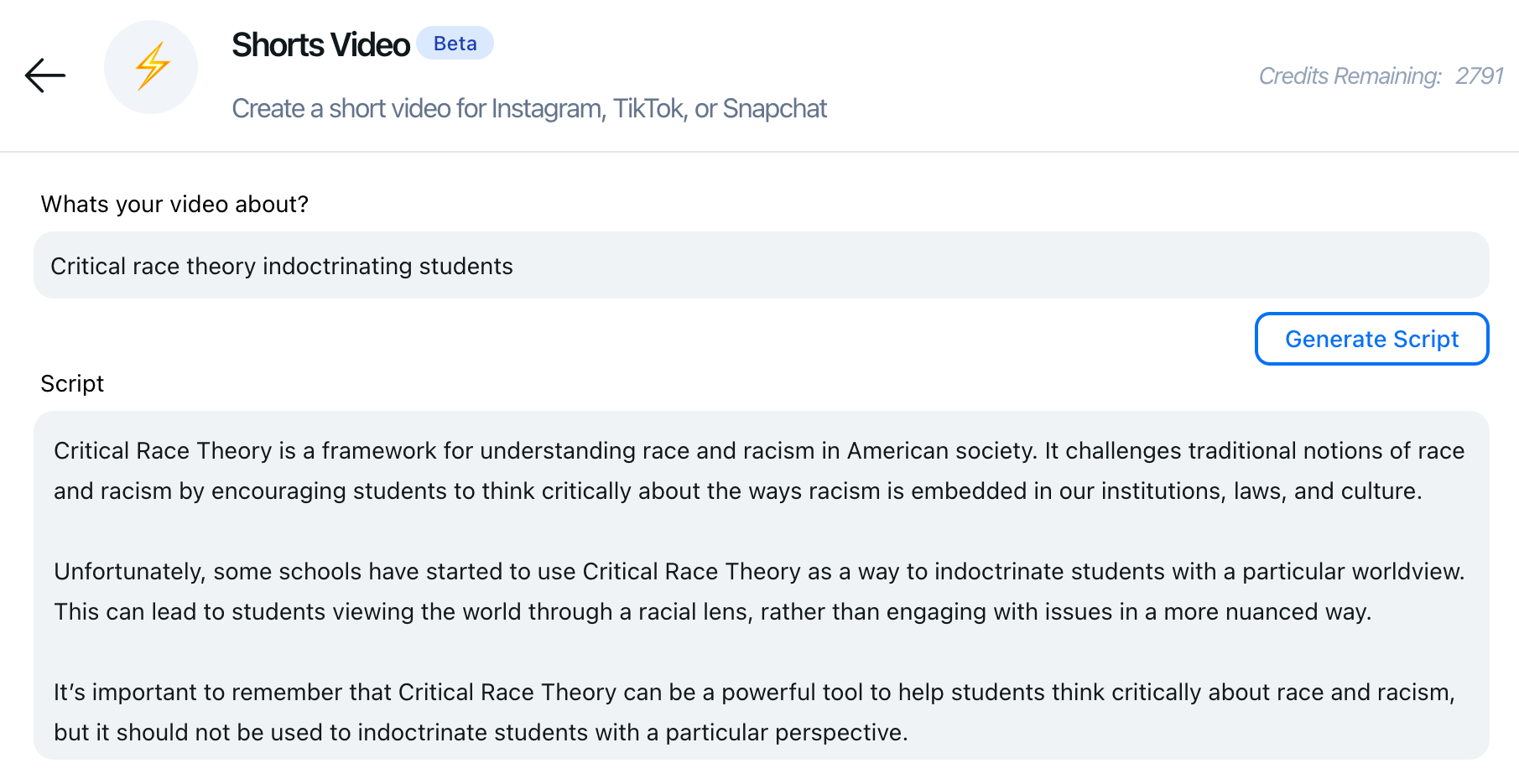Generative AI is coming for movies. a mannequin new internet web site, QuickVid, combines a quantity of generative AI strategies proper into a single computer software for routinely creating brief-sort YouTube, Instagram TikTok and Snapchat movies. Given as little as a single phrase, QuickVid chooses a background video from a library, writes a script and key phrases, overlays pictures generated by DALL-E 2, and supplies an synthetic voiceover and background music from YouTube’s royalty-free music library.
QuickVid’s creator, Daniel Habib, says that he’s constructing the service to assist creators meet the “ever-rising” demand from their followers.
“By offering creators with devices to quickly and merely produce extreme quality content material, QuickVid helps creators enhance their content material output, reducing the prospect of burnout,” Habib informed TechCrunch in an e-mail interview. “Our purpose is to empower your favourite creator to sustain with the calls for of their viewers by leveraging developments in AI.”
however counting on how they’re used, devices like QuickVid threaten to flood already-crowded channels with spammy and duplicative content material. additionally they face potential backlash from creators who decide to not use the devices, whether or not attributable to value ($10 per 30 days) or on precept, but might want to compete with a raft of latest AI-generated movies.
Going after video
QuickVid, which Habib, a self-taught developer who beforehand labored at Meta on fb stay and video infrastructure, in-constructed a matter of weeks, launched on December 27. It’s comparatively naked bones at current — Habib says that extra personalization selections will arrive in January — however QuickVid can cobble collectively the parts that make up a typical informational YouTube brief or TikTok video, collectively with captions and even avatars.
It’s simple to make the most of. First, a consumer enters a immediate describing the topic supplies of the video they should create. QuickVid makes use of the immediate to generate a script, leveraging the generative textual content material powers of GPT-three. From key phrases both extracted from the script routinely or entered manually, QuickVid selects a background video from the royalty-free inventory media library Pexels and generates overlay pictures using DALL-E 2. It then outputs a voiceover through Google Cloud’s textual content material-to-speech API — Habib says that clients will quickly be ready to clone their voice — earlier than combining all these parts proper into a video.

picture credit: QuickVid
See this video made with the immediate “Cats”:
Or this one:
QuickVid actually isn’t pushing the boundaries of what’s doable with generative AI. each Meta and Google have showcased AI strategies which will generate utterly real clips given a textual content material immediate. however QuickVid amalgamates current AI to take benefit of the repetitive, templated format of b-roll-heavy brief-sort movies, getting throughout the concern of attending to generate the footage itself.
“worthwhile creators have a very extreme extreme quality bar and aren’t interested by placing out content material that they don’t really feel is of their very personal voice,” Habib acknowledged. “that is the use case we’re focused on.”
That supposedly being the case, when it entails extreme quality, QuickVid’s movies are frequently a mixed bag. The background movies are typically a bit random or solely tangentially associated to the topic, which isn’t stunning given QuickVid’s at present restricted to the Pexels catalog. The DALL-E 2-generated pictures, in the meantime, exhibit the restrictions of at this time’s textual content material-to-picture tech, like garbled textual content material and off proportions.
In response to my suggestions, Habib acknowledged that QuickVid is “being examined and tinkered with every day.”
Copyright factors
in protecting with Habib, QuickVid clients retain the acceptable to make the most of the content material they create commercially and have permission to monetize it on platforms like YouTube. nonetheless the copyright standing round AI-generated content material is… nebulous, a minimal of presently. The U.S. Patent and Trademark office (USPTO) recently moved to revoke copyright safety for an AI-generated comic, for event, saying copyrightable works require human authorship.
When requested about how the USPTO decision might have an effect on QuickVid, Habib acknowledged he believes that it solely pertain to the “patentability” of AI-generated merchandise and by no means the rights of creators to make the most of and monetize their content material. Creators, he recognized, aren’t usually submitting patents for movies and usually lean into the creator financial system, letting completely different creators repurpose their clips to enhance their very personal attain.
“Creators care about placing out extreme-extreme quality content material of their voice that can assist develop their channel,” Habib acknowledged.
one other authorized problem on the horizon might have an effect on QuickVid’s DALL-E 2 integration — and, by extension, the state of affairs’s means to generate picture overlays. Microsoft, GitHub and OpenAI are being sued in a class movement lawsuit that accuses them of violating copyright regulation by permitting Copilot, a code-producing system, to regurgitate sections of licensed code with out offering credit rating. (Copilot was co-developed by OpenAI and GitHub, which Microsoft owns.) The case has implications for generative artwork AI like DALL-E 2, which equally has been found to copy and paste from the information gadgets on which they had been expert (i.e. pictures).
Habib isn’t involved, arguing that the generative AI genie’s out of the bottle. “If one other lawsuit confirmed up and OpenAI disappeared tomorrow, there are a quantity of options that would vitality QuickVid,” he acknowledged, referring to the open supply DALL-E 2-like system regular Diffusion. QuickVid is already testing regular Diffusion for producing avatar pics.
Moderation and spam
besides for the authorized dilemmas, QuickVid might quickly have a moderation draw again on its fingers. whereas OpenAI has carried out filters and strategies to cease them, generative AI has properly-recognized toxicity and factual accuracy factors. GPT-three spouts misinformation, significantly about latest occasions, that are past the boundaries of its knowledge base. And ChatGPT, a advantageous-tuned offspring of GPT-three, has been proven to make the most of sexist and racist language.
That’s worrisome significantly for of us who’d use QuickVid to create informational movies. In a quick take a look at, I had my associate — who’s a lot extra creative than me, significantly on this space — enter a quantity of offensive prompts to see what QuickVid would generate. To QuickVid’s credit rating, clearly problematic prompts like “Jewish new world order” and “9-eleven conspiracy idea” didn’t yield poisonous scripts. however for “important race idea indoctrinating college students,” QuickVid generated a video implying that important race idea might even be used to brainwash schoolchildren.
See:

Habib says that he’s counting on OpenAI’s filters to do a lot of the moderation work, and asserts that it’s incumbent on clients to manually evaluation every video created by QuickVid to make sure that “every little thing is all by the boundaries of the regulation.”
“As a regular rule, I think about of us should be ready to exact themselves and create no matter content material they want,” Habib acknowledged.
That apparently consists of spammy content material. Habib makes the case that the video platforms’ algorithms, not QuickVid, are biggest-positioned to get your hands on out the commonplace of a video, and that people who produce low-extreme quality content material “are solely damaging their very personal reputations.” The reputational harm will naturally disincentivize of us from creating mass spam campaigns with QuickVid, he says.
“If of us don’t should look at your video, then you undoubtedly gained’t get hold of distribution on platforms like YouTube,” he added. “Producing low-extreme quality content material will even make of us will take a look at your channel in a unfavorable gentle.”
nonetheless it’s instructive to take a take a look at advert companies like Fractl, which in 2019 used an AI system recognized as Grover to generate an whole web site of promoting supplies — status be damned. In an interview with The Verge, Fractl associate Kristin Tynski acknowledged that she foresaw generative AI enabling “an massive tsunami of pc-generated content material throughout every area of curiosity doable.”
In any case, video-sharing platforms like TikTok and YouTube haven’t needed to take care of moderating AI-generated content material on an massive scale. Deepfakes — synthetic movies that substitute an current particular person with one other particular person’s likeness — started to populate platforms like YouTube a quantity of years in the past, pushed by devices that made deepfaked footage simpler to current. however in distinction to even basically the most convincing deepfakes at this time, the types of movies QuickVid creates aren’t clearly AI-generated in any methodology.
Google Search’s coverage on AI-generated textual content material might even be a preview of what’s to get back inside the video area. Google doesn’t deal with synthetic textual content material in a distinctive methodology from human-written textual content material the place it considerations search rankings, however takes actions on content material that’s “presupposed to manipulate search rankings and by no means assist clients.” that options content material stitched collectively or mixed from completely different internet pages that “[doesn’t] add ample worth” as properly as to content material generated by purely automated processes, each of which might apply to QuickVid.
In completely different phrases, AI-generated movies will not be banned from platforms outright ought to they take off in a important methodology, however pretty merely develop to be the worth of doing enterprise. That isn’t liable to allay the fears of specialists who think about that platforms like TikTok have gotten a mannequin new house for deceptive movies, however — as Habib acknowledged by the interview — “there’s is not any stopping the generative AI revolution.”



0 Comments